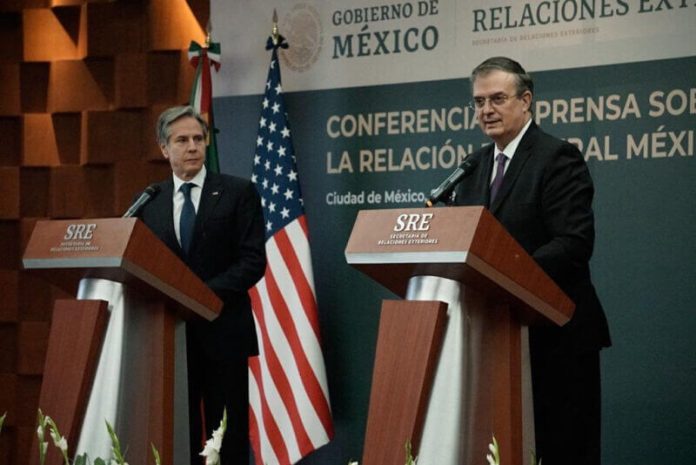Mexico and the United States have proposed “a new vision of regional security and collaboration” after top officials held bilateral talks in Mexico City on Friday.
In a joint statement, the two countries – which will celebrate 200 years of bilateral relations in 2022 – announced “a bicentennial framework for security, public health, and safe communities.”
“This new framework establishes a comprehensive and long-term approach to guide bilateral actions going forward. Together, we can build a system of peace, justice, and respect for the rule of law,” the statement said.
Mexico and the United States pledged to take concrete actions to “protect our people,” prevent transborder crime, and pursue criminal networks.
“To protect our people, we intend to pursue a memorandum of understanding to reduce substance abuse disorder and associated harms, with the intent to develop plans to prevent drug consumption, provide evidence-based treatment, and strengthen early warning systems and ability to track demand,” the statement said.
In pursuit of the “protect our people” objective, the two countries also pledged to create a network for homicide prevention.
The network will “provide a platform for the exchange of best practices in crime and violence prevention, homicide reduction, work with at-risk youth, and work toward safe and peaceful communities,” the statement said.
It also said the network would consider creating multidisciplinary homicide task forces focused on high-impact crimes linked to transnational criminal organizations, with a focus on forensic laboratories and support for investigation and prosecution.
To prevent transborder crime, Mexico intends to work with the United Nations Office on Drugs and Crime to strengthen control and management of incoming shipments for precursor chemicals, the statement said. Such chemicals commonly arrive at Pacific coast ports on ships from Asia.
Mexico and the United States also affirmed their commitment to work together to combat arms trafficking. The joint statement said the two countries will work together on the detection and interdiction of firearms and consider new strategies to combat the flow of weapons across their shared border.
“… We affirm our support for current initiatives and the need to continue current efforts to stop firearms sold in the United States from reaching Mexico, and actions to identify, target, and investigate financing, transportation, and communication methods employed by smuggling networks in order to disrupt and dismantle their operations,” the statement said.
The Mexican government is currently pursuing legal action against U.S.-based gun manufacturers, accusing them of negligent business practices that have led to illegal arms trafficking and deaths in Mexico, where U.S.-sourced firearms are used in a majority of high-impact crimes. Foreign Minister Marcelo Ebrard said last month that reducing violence in Mexico will be very difficult if the United States doesn’t do more to stop the illegal flow of weapons into the country.
Mexico and the United States also committed to expanding bilateral cooperation to counter human smuggling and human trafficking by transnational criminal organizations.
“… To pursue criminal networks, the United States and Mexico commit to increasing bilateral and parallel actions to disrupt illicit actors and their financial networks,” the statement said.
The two countries said they would target importers of chemical precursors and their their financial networks, “with special focus on import companies suspected of diverting precursor chemicals for the production of synthetic drugs, such as fentanyl and methamphetamine, to transnational criminal organizations.”
They also said they would target underground drug laboratories. “We intend to create a bilateral working group on precursor chemical regulation to standardize protocols and regulation for dual-use substances to prevent their use in the production of synthetic drugs,” the statement added.
It also said that both countries were committed to human rights and to advancing equity, civil rights, racial justice, and equal opportunity. In addition, the two countries pledged to “work with our youth to provide them with options other than joining organized crime” and share information to detect money laundering, among other initiatives.
President López Obrador says that his government employment programs such as the “Youths Building the Future” apprenticeship scheme can help steer young people away from a life of crime.
The governments of both countries also committed to forensic cooperation to help solve the thousands of cases of disappearances and forced disappearances in Mexico.
Secretary of State Antony Blinken and Homeland Security Secretary Alejandro Mayorkas were among the U.S. officials that met with López Obrador, Foreign Minister Marcelo Ebrard and other Mexican functionaries in the National Palace.
Mexico News Daily
